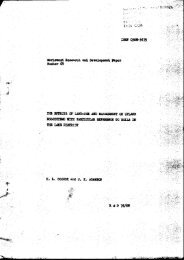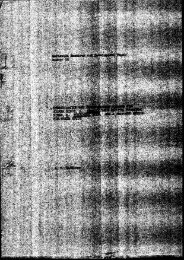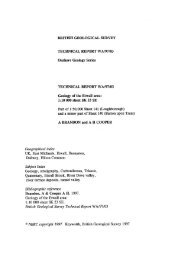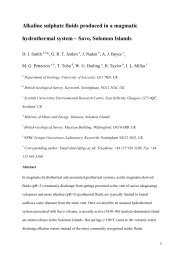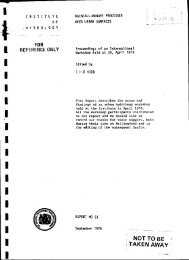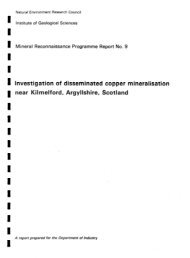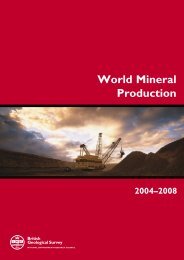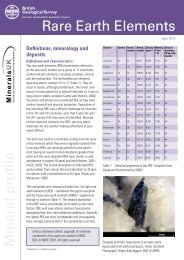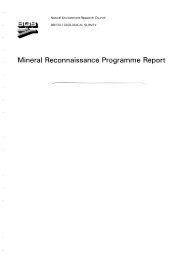You also want an ePaper? Increase the reach of your titles
YUMPU automatically turns print PDFs into web optimized ePapers that Google loves.
Fuller’s earth<br />
Fuller’s earth is a sedimentary clay that contains a high proportion of clay minerals of the smectite group, the most important of<br />
which is montmorillonite. Smectite clay minerals exhibit a unique combination of properties, including a high ‘cation-exchange<br />
capacity’. This means that calcium-smectite, the principal constituent of British fuller’s earths, can be readily converted to sodiumsmectite<br />
by a simple process involving the addition of small amounts of sodium carbonate. It is commercial practice in Britain to<br />
refer to this sodium-exchanged clay as bentonite, which exhibits markedly different properties to calcium-smectite.<br />
UK sales of fuller’s earth, most of which are in the sodium-exchanged form (bentonite), were 26 000 dry tonnes in 2004 and<br />
6200 dry tonnes in 2005 when production finally ceased, bringing to an end this long established minerals industry. UK imports<br />
of bentonite in 2005 were 155 832 tonnes valued at £10.6 million.<br />
Fuller’s earth was formerly produced by two companies in the UK: Rockwood Absorbents (Baulking) Ltd and Steetley Bentonite<br />
and Absorbents Ltd. Rockwood Absorbents (Baulking) Ltd produces fuller’s earth at Baulking in Oxfordshire. The clay was processed<br />
on site, mainly for conversion into bentonite for use as a filler and fibre retention aid in papermaking and as a bonding<br />
agent for foundry sand. The original Baulking quarry was exhausted in summer 2002 and is now restored. Until the closure of<br />
the Baulking plant in October 2005, sales were based on stockpiles of crude fuller’s earth, both from Baulking and the company’s<br />
former operation at Clophill in Bedfordshire. Remaining permitted reserves of fuller’s earth in the Baulking area are confined to a<br />
small satellite deposit at Moor Mill Farm, about 2 km from the plant at Baulking. The deposit contains reserves of some 300 000<br />
dry tonnes and was granted planning permission in 1998 and was to have been opened up in 2004. However, a significant deterioration<br />
in the market for fuller’s earth has rendered such a small deposit uneconomic and no working will now take place.<br />
Steetley Bentonite and Absorbents Ltd, a wholly-owned subsidiary of Tolsa SA of Spain, formerly produced fuller’s earth near<br />
Woburn in Bedfordshire. A planning application to extract fuller’s earth from a southern extension to the deposit (Wavendon<br />
Heath South) was turned down in early 2001. The application was the subject of a public inquiry in September 2001 but the<br />
appeal was dismissed by the former ODPM in July 2002. A challenge to this decision was made in the High Court in February<br />
2003 but was also dismissed. Consequently fuller’s earth extraction ceased at Woburn in December 2004 with the exhaustion<br />
of the remaining reserves and marking the end of a long history of fuller’s earth working in the area where it is thought to have<br />
been extracted as early as Roman times. Large-scale extraction in the Woburn area by F W Berk Ltd (acquired by the Steetley<br />
Co Ltd in 1970) started in 1951 and continued, with a small break between 1954 and 1957, until 2004. The current workings in<br />
Aspley Wood started in 1961 and have continued with a series of extensions to the original permission. The Wavendon Heath<br />
South site, covering some 54 hectares and containing some 320 000 tonnes of dry product, sufficient for about ten years output,<br />
would have been the last site in the area. In recent years fuller’s earth form Woburn has been used almost entirely as a filler and<br />
fibre retention aid in papermaking.<br />
united Kingdom summary 2000–2004<br />
Commodity 2000 2001 2002 2003 2004 2000 2001 2002 2003 2004<br />
Tonnes £ thousand<br />
Fuller's earth<br />
Crude production 103 000 … 33 000 19 000 115 000<br />
Sales (a) 65 500 52 000 (b) 44 200 (b) 34 000 (b) 28 000<br />
Imports 6 563 5 896 9 115 7 085 2 574 780 611 849 697 316<br />
Exports 429 121 74 254 124 157 80 61 53 59<br />
(a) BGS estimates based on data from producing companies. Dry weight. (b) Including sales from stockpiles.<br />
gas, natural (see Petroleum)<br />
germanium<br />
united Kingdom summary 2000–2004<br />
Commodity 2000 2001 2002 2003 2004 2000 2001 2002 2003 2004<br />
Tonnes £ thousand<br />
germanium<br />
Imports<br />
Metal 75 7 10 4 2 1 845 921 478 595 1 982<br />
Exports<br />
Metal 37 10 0 3 1 1 039 668 82 18 86<br />
49



